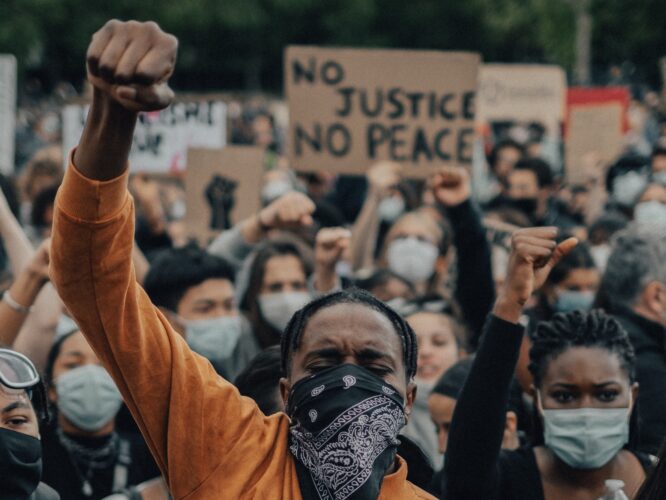I have evaluated Critical Theory and Critical Race Theory that grows out of it, (from here designated CRT) in several articles on my Facebook official page based on reading works from supporters and reading from those who are critics of the theories, both secular and Christian critics. My conclusion is that CRT is profoundly contrary to the Biblical World View. One book, by Voddie Baucham, a black Baptist theologian and missionary to Africa, gives a profound evaluation on a world view basis.
The quest for equality of worth was originally a biblical norm. Heresies from that norm are dangerous. They turn the biblical ideas of justice into either a Marxist idea of equality of outcomes, as in income, or to the new idea of equity in outcomes. It teaches that American society is to be divided into different ethnicities including categories of new sexual identities represented by the letters LGBTQ etc. On this basis of equity financial prosperity, educational access, and success in various life roles and positions are to be divided by the proportion of the numbers of such people in the society. Such a quest will be a never-ending failure and a source of continual strife. Can you imagine this dividing for those of Asian background (the Chinese are really not the same as Japanese, Indians, Philippinos, or Indians) Hispanic and others? Biblical justice is defined in my book Social Justice. Justice, first of all, is motivated by love. Love is defined by passionate identification with the other that seeks their good guided by law. Their good is their destiny fulfillment which begins with loving and knowing God and then fulfilling his calling which is according to the gifts and talents he gives. Justice or civil righteousness is an order where the maximum number of people can fulfill their destiny. The Bible makes it clear that God’s ideal will includes sufficient material provision for people. The Bible does not orient us to divide in conflict over the goods of society. Rather it calls us to a different way.
First of all, anti-racism or anti-ethnocentrism begins with Biblical affirmations that all human beings are created in the image of God. Each human being thus carries unique value and is worthy of being respected and treasured. Only people influenced by the Bible gave credibility to the idea of the equal basic worth of human beings. Study the history of the world and you will not find this idea outside of the influence of biblical faith. Yes, societies that claimed to be Christian often did not live out the implications of biblical faith. They reflect the well-quoted statement of G. K. Chesterton responding to people who said, “Christianity has been tried and found wanting.” Chesterton responded and said, “No, Christianity has been found difficult and untried.” The most profound charter of anti-racism and the only charter comes from the Bible or law influenced by the Bible. This unique universalism of the Bible has been the foundation of human rights such as found in the Universal Declaration of Human Rights, largely authored by the godly Christian scholar Charles Malik. Though there are movements for equality and equity not based on biblical norms and some contrary to biblical norms, I don’t believe due to the sinfulness of fallen humans that such movements will succeed. Again, such equality movements are only in nations that have biblical influence in their history. In rebellion against God, these movements are bound to lead to failure and more despair. New Testament affirmations against racist and ethnic superiority and domination are unique and profound. “From one He made every nation of men to live on the face of the earth, having set the appointed times and the boundaries of their territory. They were to search for him and perhaps grope around if and find Him. Yet He is not far from each of us, for in him we live and move and have our being. Jacob (James) can say concerning the tongue, “With it, we bless our ADONAI and Father, and with it, we curse people, who are made in the image of God. . . My brothers and sisters, these things should not be.”
In Revelation 21:26, each nation brings its distinct glory into the eternal Kingdom, the New Jerusalem, the new Kingdom. So, every nation in the redemption has a distinct glory and will make a distinct contribution. Rev. 21 shows the fulfillment of God’s covenant with Abraham. He was not chosen, and Israel was not chosen as the superior race, but as a servant nation to bring the nations of the world into the Blessing of God.
Biblical assertions of the foundational equal worth of all human beings if etched into the United States Declaration of Independence, “that all men are created equal” and have inalienable rights from the Creator. The Good News leads to reconciliation between all races and ethnicities who become one with Jewish followers of Yeshua. They are called new creations in the Messiah (II Cor. 5:17) and are given the highest status together, “Raised with him and seated with him in heavenly places,” at the very throne of God (Eph. 2:5).
Contrary to CRT and CT, there is objective truth. We are not relativists. For CRT proponents their quests for equality and equity are power assertions of choice based on what philosophers call an emotive preference. It is not based on objective truth and ethics. There is no answer in CRT as to why the strong should not dominate and enslave the weak and make them serve them. There is no answer to Nazism except for personal emotive aversion. Nazis like the idea of the domination and survival of those who can conquer. It causes humans to evolve and become stronger. It fits Darwin!
We are speaking here of the ultimate foundations and the picture of ultimate redemption. However, the human race is divided by self-centeredness, strife, hatred, prejudice, the domination of one nation by another and even slaughter and genocide. The profound level of sin and its effect on the world is clearly revealed in a study of world history. CRT people point to the sins of western civilization but rarely point to the slavery and genocide that has been a great part of world history, especially in the East or in Africa or even in pre-colonial Mexico for example.
The Gospel of the Kingdom makes its debut in Israel and Yeshua announces Good News to the poor. The power of God is so great that Yeshua announces his ministry through the power of the Spirit as being Good News to the poor, recovery of sight to the blind, the release of prisoners, etc.” (Luke 4:18) The Gospel first comes to those in society beginning in Israel with those who are marginalized. This is so contrary to Roman culture. The often misunderstood beatitudes in Matthew 5 are very much in line with Luke 4:18. Blessed are the poor, for poverty no longer determines their identity or destiny. The meek who are trampled upon will inherit the earth. The mourners will no longer be trapped in mourning, for they will be adequately comforted. The great reversal of conditions comes with the coming of Yeshua. If one is truly in Yeshua then one can no longer claim to be a victim since his power enables us to fulfill a destiny and purpose in him with eternal reward.
Gospel realism states that all have sinned, and that sin will land us in Hell if we do not repent and receive the great atonement of his death for our sins and resurrection life in his Spirit. Once this is embraced, God calls us to be joined to communities of reconciliation. Galatians 3:28 provides a most radical anti-racist text, that in Yeshua there is, “Neither Jew or Gentile, male or female, slave for free.” Rather we are all one in him and form one new humanity in him (Eph. 2:15). This should not be read as eliminating Jewish calling and identity or homogenizing ethnic identities. The Bible values the good in cultures, but the Bible is also the norming norm for evaluating what is good and bad in cultures. Biblical multi-culturalism does not like CRT trivialize the value of all cultures by claiming they are all equal. However, the value of our ethnic identity, even Jewish identity is now made secondary to the centrality of our oneness and equal status in Yeshua (Eph. 2:5). The Bible, therefore, calls us to the ministry of reconciliation, to be reconciled to God and to one another.
The Bible also is very clear about our priorities of commitment in sharing the Gospel. It is first to the poor and marginalized. They have the first right of refusal. The preaching of the Gospel is offered first as well to the Jews as the covenant people (Romans 1:16) but other than this, the first right of refusal in the great Gospel offer is to the marginalized, the poor, imprisoned, the crippled, the disposed of, the ill, the rejected. This offer is not made on the basis of race preferences but without regard to race and ethnicity. Not many of high status first responded, says Paul. While the Bible allows for disparities of wealth, those who are rich are exhorted in the strongest terms to invest their wealth to lift the weak and poor or they and also that their riches will perish. God, says James, has chosen the poor of this world to inherit the Kingdom. (James 2:1-4, 5:1-6). His warning to the rich is delivered with severe words of warning. Lifting the poor is part of the essence of the Gospel and its outworking.
Generally, the history of the world does not include multi-ethnic, multi-racial societies (my view is that race is a social-cultural construct but ethnicity is real and objective). The Roman Empire comes closer to this but still was far different than the United States and its liberties. So, the Bible does not speak to the situation of the new reality of such societies directly, but its principles have profound implications. If a particular race or ethnicity has a high proportion of those who are poor, marginalized, and imprisoned, that race or ethnicity should receive a high or disproportionate focus of outreach and care. This is the clear implication of Luke 4:18 and the teaching of Yeshua and the Apostles. In one sense the Gospel is race-neutral but in another sense, the issue of race is dealt with on the basis of the Gospel mandate if a group is poor and marginalized. Yes, the rich are offered the Gospel, but they are not the primary focus of the efforts! The power of the Gospel really does deliver! Salvation is more than going to heaven.
I note that the issue of privilege can never be solved by multiplying civil laws. Those with two parents in a loving marriage have the privilege. Those who are beautiful versus those who are homely (this does affect hiring!), those who are handicapped versus those who have normal physical abilities, those who come from prosperous homes versus those from poor families, those children who were not abused, and those who were, show all kinds of privilege and disadvantage. CRT does not know what to do with the prosperity of Asians who obviously are not white and not held back by white privilege. There are social patterns and values in Asian families that do give them a leg up (privilege). The Bible teaches that God gives different giftings and callings; gifts and talents are distributed by God. However, again the answer is the Gospel. Those who embrace the Gospel and live in and from the Kingdom of God are empowered by the Spirit and can hear the voice of God leading them to a successful life. All levels of underprivilege can be overcome by the Spirit and power of God.
The outworking of the Gospel is to create communities of reconciliation. Before society is influenced (the New Testament talks little about this) we are to create communities that are a model for society, communities of transformation with great interethnic love and mutual appreciation, serving and humility.
At this point, I evaluate the American Church as mostly a failure. There are wonderful exceptions. The idea of mobilizing the churches in mass to be involved and focused without distraction on the poor and marginalized just has not captured the minds and hearts of the 20th century and now the 21st century Church in America. Yes, again, I can point to wonderful exceptions. There have been rescue missions, ministries like David Wilkerson in Teen Challenge, reaching gangs and those dealing in drugs. What would have happened if the Black, White and Hispanic churches pledged themselves in mutual love and commitment and created massive programs for the needy.
I will return to the issue of who should repent. For CRT all whites are guilty and should repent and even pay reparations (almost forever and ongoing!). The Pole, the Arminian, and the Ukrainian who came last week to America now have white privilege and have to repent for white privilege and systemic racism. CRT fosters false guilt and no possibility of real redemption. However, the Bible does foster repentance from real guilt, and corporate guilt can be inherited if there is no repentance and restitution. First, any individual who has held prejudice in his or her heart must repent. Secondly, we repent for the history of racism in the Church bodies, both the racism that was overt and the actions of not caring or apathy. Every individual who did now care about poor blacks can repent of apathy and leaders can repent for not leading churches out of apathy. When the Southern Baptists and the Assemblies of God repented for purposely embracing segregation as a policy in their past, this was appropriate repentance for real guilt. The next steps would be involvement in poor communities, preaching the Gospel, mentoring, serving, educating, and more. Perhaps whites who had ancestors who held slaves can repent and renounce the sins of their ancestors and act redemptively in involvement to lift poor black people. That would be wonderful. The United States can still repent for not passing laws in the past that would have eliminated discriminatory practices, such as housing loans for those who qualify but are black. Great progress has been made on this. Such repentance needs to ask God’s forgiveness. Bible teaching is focused on real guilt, not a generalized fake guilt where the specifics of sin are not made clear. The idea that an institution is racist can only be the case if people with racist intent set up institutions that discriminated in unfair ways. There has to be clear objective evidence (CRT does not believe in objectivity!) The institution may inadvertently be wrongly organized and need changing but racism is a wrong redefinition of the term.
One more thing that will be hated by secularists is that the poor and underclass blacks have to repent when they embrace the Gospel, repent of bitterness, anger, and hatred, and to forgive the whites that did wrong to them. Of course, they repent of their violations of God’s laws. When CRT teaches that all cultures are equal and that such standards as punctuality, correct math answers, precision, language skills, etc. are racist, they destroy the potential for blacks to succeed. All cultures are not equal. Some are better and others as judged by the Bible as the norming norm. The Bible teaches that all have radically sinned and that our debt before God is incomparably greater than any debt we are owed. This stand brings mutual humility and forgiveness though we indeed weigh the sin of the wealthier as much greater.
When CRT lays guilt on all whites, no matter their history, and points to vague institutional guilt due to disparate levels of success in racial and ethnic groups, it lowers the potential for real healing and progress. CRT really offends truth when socialistic solutions to help the poor are considered the only absolute answer. Those who oppose such solutions are racist, eg. Medicare for all. Actually, vouchers for the needy would bring competition and much better medical care for the poor than government-run health care.
So, we begin our anti-racism program with massive church repentance and a massive re-direction of the Church. May there be a movement toward this end that will grow and grow. Some years ago, Donald McGavran argued that churches grow best when they are more homogenous. People gravitate to their kind of people, their style of music and worship, their cultural ways of being. While we may give some acceptance to this being natural, the Gospel requires that we act beyond being comfortable with our own kind. A mostly white Church and a mostly black church need to deepen mutual involvement and relationships to demonstrate the power of reconciliation and effective ministry together.
The program of the churches that commit themselves to anti-racism focus first on the basic Gospel and discipleship programs. It incorporates those who are won into the church with a strong emphasis on discipleship. Training programs are also needed for parenting. Rebuilding marriage and biblical families in the black underclass will be a crucial emphasis.
However, we have to begin with the situation as it exists with many coming from single-parent mother-led homes. Discipling the mothers is so important. Many single mothers are illiterate. They need education and training. Some of the best programs I have seen begin with children and teens and puts them into tutoring programs and then full-time schools with a Gospel emphasis. There are several such programs. Until vouchers are available from public funds (they are available in some states) we need to mobilize wealthy people and all who can give to fund such schools. The CHATS (Church Hill Activities and Tutoring and Schooling) program in Richmond, Virginia, is one such program I support. They maintain a full high school and the success rate is amazing. It challenges the lie that blacks must fail due to racism for the graduates of this ghetto school to succeed, and greatly so. Overcoming massive illiteracy is crucial. Public schools in ghetto communities graduate many illiterate poor from high school if they stay in school! Practical job training needs to be part of such schools. Christians can provide vocational training.
Other programs that attract children and teens in sports and art are helpful. This opens people up to the joy of performance and beauty.
If the Church had focused on prayer, power ministry, and serving as it should have, we would not have the racial issues today which frankly are exploited by the neo-Marxist left to foster their revolution.









